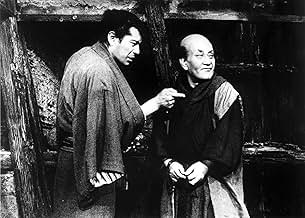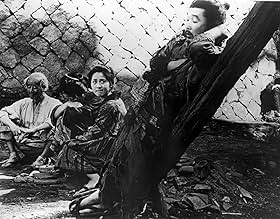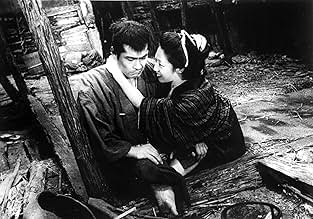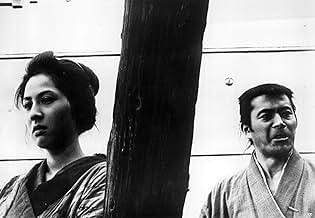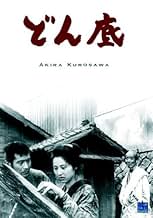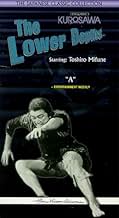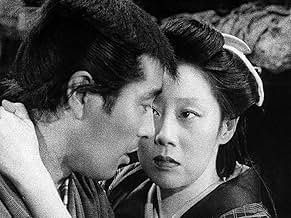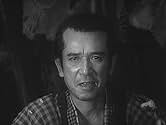AVALIAÇÃO DA IMDb
7,2/10
6,3 mil
SUA AVALIAÇÃO
Adicionar um enredo no seu idiomaIn a Japanese slum, various residents play out their lives, dreaming of better things or settling for their lot. Among them is a man who pines for a young woman but is stymied by her decepti... Ler tudoIn a Japanese slum, various residents play out their lives, dreaming of better things or settling for their lot. Among them is a man who pines for a young woman but is stymied by her deceptive family.In a Japanese slum, various residents play out their lives, dreaming of better things or settling for their lot. Among them is a man who pines for a young woman but is stymied by her deceptive family.
- Direção
- Roteiristas
- Artistas
- Prêmios
- 5 vitórias no total
Kamayuki Tsubono
- Tradesman
- (não creditado)
- Director
- Roteiristas
- Elenco e equipe completos
- Produção, bilheteria e muito mais no IMDbPro
Avaliações em destaque
Kurosawa meant this to be a fairly straightforward filming of the Gorky play and it is. Like most filmed stage plays, it relies heavily on dialogue and a good translation for people who don't speak Japanese. Fortunately, the new Criterion DVD supplies this. You have to get some appreciation for the characters before this film comes alive, which it did for me about half way through. I watched it again and greatly enjoyed the entire film. Unlike the French version with Jean Gabin, Kurosawa does not single out any one character as the focus, which is not easy with Mifune in the picture. (He is not in the last quarter of the film). At first, we seem to have only a mob of quarrelsome boarders in a flophouse, but the personality of each one gradually emerges--the gambler, the actor, the barrel maker, the thief, the prostitute, the former samurai, the priest. Each one alternately harangues and supports the other boarders, while trying to maintain some shred of dignity to themselves. I would not recommend it as an introduction to Kurosawa (try Ikiru or Red Beard) but give it a try. 4 out of 5.
I enjoyed it. Everyone in the movie has very distinct character. I really enjoyed the superb performances of skilled actors who acted without going out from the dirty room and surrounding area.
After watching the movie, I read its original stage drama, "The Lower Depth" by Gorky. Most of the characters and the scripts are the same as the original drama. On Gorky's book, I could not help reading it with exact accent and gesture in the movie. Particularly, I can't imagine better way of speaking the pilgrimage Luke's scripts than Kahei acted by Hidari Bokuzen. I am sure the scripts of the movie are based on Nakamura Hakuyo's Japanese translation published from Iwanami. Even the Russian stage drama is adapted to completely different locale, you don't feel any awkwardness. This means perhaps, both the original drama and its adaptation are really great.
What only a movie could do is that you can enjoy subtle expression of countenance at close up. There are unforgettable performances by face, such as the moment of instant tension when the land owner, acted by Nakamura Ganjiro, and Sutekichi the thief, acted by Mifune Toshiro, stand together; or the moment the actor, acted by Fujiwara Kamatari, goes out of the house after gulping sake.
The scene of dancing with mouth instrumentation ('kuchi-syamisen in Japanese) is a great fun. Particularly I enjoyed the fat man Tsugaru dancing with sling; I found the actor is a professional sumo wrestler.
The most unforgettable personality is the old man Kahei. Can I become such a nice old man who can solace and encourage everyone around me? This movie can work out without Sutekichi the thief, but the old man. Therefore, the old man Kahei could be the lead character.
By the way, as a movie that describes the lower depth life with humor and music, I remember "Woman of Breakwater", by Philippine director Mario O'Hara. People in "Woman of Breakwater" came to live outside of the breakwater of Manila Bay. Everyone wants to flee from there, but can not. Just behind the breakwater is a park, and modern buildings. Describing the life of the poor out of the sight of the rich, it portrays mutual love among the people. "Donzoko" does not have such social viewpoint. Instead, it tries to show ugliness and kindness of everyone as a comedy.
After watching the movie, I read its original stage drama, "The Lower Depth" by Gorky. Most of the characters and the scripts are the same as the original drama. On Gorky's book, I could not help reading it with exact accent and gesture in the movie. Particularly, I can't imagine better way of speaking the pilgrimage Luke's scripts than Kahei acted by Hidari Bokuzen. I am sure the scripts of the movie are based on Nakamura Hakuyo's Japanese translation published from Iwanami. Even the Russian stage drama is adapted to completely different locale, you don't feel any awkwardness. This means perhaps, both the original drama and its adaptation are really great.
What only a movie could do is that you can enjoy subtle expression of countenance at close up. There are unforgettable performances by face, such as the moment of instant tension when the land owner, acted by Nakamura Ganjiro, and Sutekichi the thief, acted by Mifune Toshiro, stand together; or the moment the actor, acted by Fujiwara Kamatari, goes out of the house after gulping sake.
The scene of dancing with mouth instrumentation ('kuchi-syamisen in Japanese) is a great fun. Particularly I enjoyed the fat man Tsugaru dancing with sling; I found the actor is a professional sumo wrestler.
The most unforgettable personality is the old man Kahei. Can I become such a nice old man who can solace and encourage everyone around me? This movie can work out without Sutekichi the thief, but the old man. Therefore, the old man Kahei could be the lead character.
By the way, as a movie that describes the lower depth life with humor and music, I remember "Woman of Breakwater", by Philippine director Mario O'Hara. People in "Woman of Breakwater" came to live outside of the breakwater of Manila Bay. Everyone wants to flee from there, but can not. Just behind the breakwater is a park, and modern buildings. Describing the life of the poor out of the sight of the rich, it portrays mutual love among the people. "Donzoko" does not have such social viewpoint. Instead, it tries to show ugliness and kindness of everyone as a comedy.
First, I must provide the obligatory warning that this film is absolutely not a good film for introducing a viewer to the power of Kurosawa. Nevertheless, this film is one of his most well-crafted ensemble films. The performance of Bokuzen Hidari as the wandering pilgrim or priest Kahei is his pinnacle in Kurosawa's films. After his comic-relief roles in the more well known films "Ikiru" and "Seven Samurai", this role is Hidari's chance to show his own version of wisdom and authority. Similarly, Kamatari Fujiwara's powerfully sympathetic performance as the alcoholic actor is another surprising demonstration by an actor who had, hitherto, been cast in unsympathetic- even adversarial roles in previous Kurosawa films. As one comes to expect from Isuzu Yamada, her character is a feisty and commanding presence that drives the plot along.
Toshiro Mifune, however, was not the best choice for his role as the petty thief- try as he might to look like a immature and puerile common criminal , the false swagger fails to hide the actor's inherent dignity. Nevertheless, his energy and effort still make his performance believable- if incongruous. In general, however, his unsuitability for his role is the only significant snag in an otherwise fluid and natural performance on the part of all the actors. Also, the sets, as one would expect for Kurosawa, are meticulously detailed, well-lit, and authentic-seeming.
The story- based on the Maxim Gorky play, however, is not that compelling. In part, I think, it is my reaction to a socialistic morality play brought to the silver screen. Also, however, Kurosawa has tried too hard and has polished the performance and settings for too long. As well and smoothly as the actors interact, as convincing they are in their roles, their performance just does not lead anywhere dramatically. However, I saw the Jean Renoir version- a much less refined effort, in my opinion- and had much the same reaction, concluding that the story, itself, and not Kuroasawa's over-controlling treatment is what hampered my engagement.
In spite of that... That is to say... In spite of the fact that the movie's story is not very compelling for me at all, I still have high regard for the film because the acting performances are so solid and engaging. For that reason, I strongly urge devotees of Kurosawa's films to check this movie out at some point while keeping in mind that it remains less than a sum of its parts.
Toshiro Mifune, however, was not the best choice for his role as the petty thief- try as he might to look like a immature and puerile common criminal , the false swagger fails to hide the actor's inherent dignity. Nevertheless, his energy and effort still make his performance believable- if incongruous. In general, however, his unsuitability for his role is the only significant snag in an otherwise fluid and natural performance on the part of all the actors. Also, the sets, as one would expect for Kurosawa, are meticulously detailed, well-lit, and authentic-seeming.
The story- based on the Maxim Gorky play, however, is not that compelling. In part, I think, it is my reaction to a socialistic morality play brought to the silver screen. Also, however, Kurosawa has tried too hard and has polished the performance and settings for too long. As well and smoothly as the actors interact, as convincing they are in their roles, their performance just does not lead anywhere dramatically. However, I saw the Jean Renoir version- a much less refined effort, in my opinion- and had much the same reaction, concluding that the story, itself, and not Kuroasawa's over-controlling treatment is what hampered my engagement.
In spite of that... That is to say... In spite of the fact that the movie's story is not very compelling for me at all, I still have high regard for the film because the acting performances are so solid and engaging. For that reason, I strongly urge devotees of Kurosawa's films to check this movie out at some point while keeping in mind that it remains less than a sum of its parts.
It's one of Kurosawa's most neglected masterpieces. "The Lower Depths" takes us into a ravine tenement, run by greedy, brutal landlords, and inhabited by the lowest of society's strata. All action takes place in two locations: the interior of the tenement, or the tenement grounds.
How amazing, then, is the fascination this film exerts on us, with its very modest settings. I am astonished at the creativity of the film shooting these restricted spaces, in so many varied and telling ways: space expands and contracts as is necessary to the story: the outside is either threatening or an escape, but even once outside, we see that there is no escape, and diagonals show us the human dimensions of restricted choice. Space speaks volumes in the film, accompanied by the beauty of the ensemble acting, expressing profound truths.
We find ourselves engaged in the lives of these people, and puzzled over the character of Bokuzen Hidari as the pilgrim. Is he good? If he is good, and pacifies the dispossessed by acknowledging their illusions, does it mean that self-deception is good? What wonderful ensemble acting! The director put them through long, tough rehearsals, and the result is a seamless film. No wrong notes, no overacting, just a beautiful and strange film that haunts us after we've experienced it. Such invisible, great acting, and humor and pathos.
The character of the actor is the finest piece of work by the Kurosawa veteran Kamatari Fujiwara. It is amazing that this actor appears in such diverse roles as Matahichi in "The Hidden Fortress" and as a corrupt executive in "The Bad Sleep Well". What astonishing range and depth! How brilliantly Kurosawa uses the actor's range! And, of course, we have our beloved Toshiro Mifune, laughing, kicking up his heels in devilish delight, trying to impress the girl, pouting with the landlady, listening with suspicion, then respect to the pilgrim...doing so many things so well, we are bereft when he is absent for the film's conclusion.
And what a conclusion! The harsh clappers that end the movie, the frontal shot of the gambler as he addresses us (for the only time in the film) directly, and the sudden end! Gorky...Kurosawa, Bokuzen Hidari, Toshiro Mifune, Kamatari Fujiwara and the rest....they live on in this masterpiece, for which I am very grateful.
How amazing, then, is the fascination this film exerts on us, with its very modest settings. I am astonished at the creativity of the film shooting these restricted spaces, in so many varied and telling ways: space expands and contracts as is necessary to the story: the outside is either threatening or an escape, but even once outside, we see that there is no escape, and diagonals show us the human dimensions of restricted choice. Space speaks volumes in the film, accompanied by the beauty of the ensemble acting, expressing profound truths.
We find ourselves engaged in the lives of these people, and puzzled over the character of Bokuzen Hidari as the pilgrim. Is he good? If he is good, and pacifies the dispossessed by acknowledging their illusions, does it mean that self-deception is good? What wonderful ensemble acting! The director put them through long, tough rehearsals, and the result is a seamless film. No wrong notes, no overacting, just a beautiful and strange film that haunts us after we've experienced it. Such invisible, great acting, and humor and pathos.
The character of the actor is the finest piece of work by the Kurosawa veteran Kamatari Fujiwara. It is amazing that this actor appears in such diverse roles as Matahichi in "The Hidden Fortress" and as a corrupt executive in "The Bad Sleep Well". What astonishing range and depth! How brilliantly Kurosawa uses the actor's range! And, of course, we have our beloved Toshiro Mifune, laughing, kicking up his heels in devilish delight, trying to impress the girl, pouting with the landlady, listening with suspicion, then respect to the pilgrim...doing so many things so well, we are bereft when he is absent for the film's conclusion.
And what a conclusion! The harsh clappers that end the movie, the frontal shot of the gambler as he addresses us (for the only time in the film) directly, and the sudden end! Gorky...Kurosawa, Bokuzen Hidari, Toshiro Mifune, Kamatari Fujiwara and the rest....they live on in this masterpiece, for which I am very grateful.
"Donzoko" does not rank among Akira Kurosawa's finest films, but that doesn't mean it should be dismissed, considering the quality of his body of work.
Not many films have explored the moral decadence of humanity in face of poverty such as "Donzoko". It reminds us of how most humans are, deep down, only worried about themselves and their own worldy pleasures.
The inclusion of the "Old Man" gives the film an almost Buddhist insight into the situation of the slum, which helps painting its extremely intriguing - even if limited - canvas.
7.7/10
Not many films have explored the moral decadence of humanity in face of poverty such as "Donzoko". It reminds us of how most humans are, deep down, only worried about themselves and their own worldy pleasures.
The inclusion of the "Old Man" gives the film an almost Buddhist insight into the situation of the slum, which helps painting its extremely intriguing - even if limited - canvas.
7.7/10
Você sabia?
- CuriosidadesThe entire film was shot mostly in sequence and was finished in about four weeks.
- Citações
Sutekichi the Thief: Lies trump the truth every time.
- ConexõesFeatured in 62nd Annual Academy Awards (1990)
Principais escolhas
Faça login para avaliar e ver a lista de recomendações personalizadas
- How long is The Lower Depths?Fornecido pela Alexa
Detalhes
- Tempo de duração
- 2 h 17 min(137 min)
- Cor
- Mixagem de som
- Proporção
- 1.37 : 1
Contribua para esta página
Sugerir uma alteração ou adicionar conteúdo ausente

